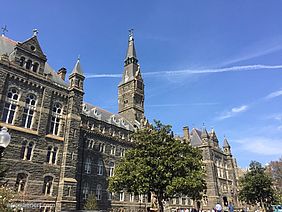HR consultancy Emerging is a leading international company specialising in connecting companies and institutions of higher education on a global scale. This company annually publishes a ranking, listing universities whose students are the most popular as employees with companies from all over the world. This ranking is published by Times Higher Education, and combines experience and human expertise with research and data-based technology.
The ranking includes 250 universities across 43 countries, from the US to Japan. Employers were asked to vote for institutions both in their own country and around the world, if they recruited internationally. The polling was conducted by an independent research agency, Trendence, commissioned by Emerging. 9,000 recruiters from more than 22 countries rated the employability performance of 6,000 international institutions. The survey provides unique data and insights as to the strategies that could be applied to meet the challenges of future training and what the main indicators of employability are. It also determines the decisive factors behind the recruiters’ choice of the best universities. For the complete 2020 rankings, please visit the homepage of Times Higher Education World University Rankings.
The study finds that the availability of graduate jobs for the most part depends on professional experience built into degree programmes, which is common practice in many European countries such as France, Switzerland and Germany. France, Germany and China are among the best represented countries in the employability ranking, alongside the UK and the USA. Singapore, Japan and the UK each have one or two institutions in the top 10. Japanese and Canadian universities also feature high in the ranking.
The ranking is headed by the California Institute of Technology which admits students on the basis of strong maths, science and engineering skills.The student population is one of the smallest in the world, with just over 1,000 undergraduates and 1,200 postgraduates. Caltech students frequently work with the innovative tools and technologies to tackle some of most pressing issues of modern society. Caltech hosts, among others, the Resnick Sustainability Institute, whose main research areas include solar geoengineering, ecology and biosphere engineering, as well as hydroengineering.The 2nd place in the ranking was awarded to the Massachusetts Institute of Technology (MIT). MIT students, alumni and faculty members play key roles in entrepreneurial innovations, related to, for example, advanced computer networks and biotechnology, as well as the design and improvement of renewable energy systems, such as solar energy, hydropower or energy storage.The 3rd place was occupied by Harvard University, the oldest and possibly most prestigious college in the United States, with a reputation for bringing forth highly intelligent and skilled students.The university boasts 48 Nobel prizewinners and 48 Pulitzer winners. Harvard has a long history of outstanding research and innovation, including in the fields of energy efficiency, battery science and CO2 capture. At Harvard, students are offered the opportunity to undertake extracurricular activities while studying in order to endow them with the essential skills to succeed.
Places 4 and 5 are occupied by the University of Cambridge and the University of Oxford. Their graduates enjoy a high reputation globally, particularly because of their specialist knowledge gained as a result of personal tuition, which is unique to the universities of Oxford and Cambridge in the UK. Oxford also has an extensive careers service for both current students and alumni, including internships and skills workshops. It therefore comes as no surprise that according to the university website, six months after leaving, the majority of graduates have either found work or are in further study.
Places 6 to 10 feature two Asian universities –the University of Tokyo (6th position) and the National University of Singapore (9th position). The National University of Singapore has, for example, gained renown for its outstanding research in integrating renewables into energy grids and the design of e.g. novel energy distribution networks, smart buildings and home automation, as well as wireless sensor-actuator networks.
In total, 51 US universities are represented in the rankings, which makes them the absolute leader, followed by 18 French universities, 17 German, as well as 14 UK institutions. 16 European countries have their universities included in the rankings. In Asia, China and Japan host the most popular universities, featuring 10 and 8 institutions, respectively.
